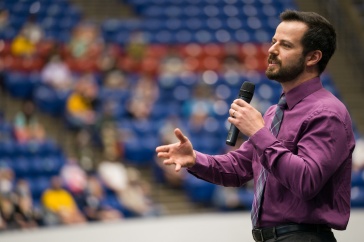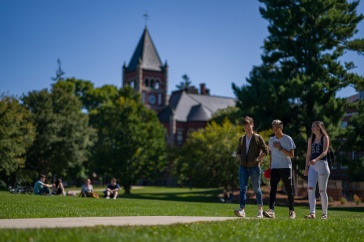“Among the Powers of the Earth: The American Revolution and the Making of a New World Empire” (Harvard University Press, 2012) by Eliga Gould, professor of history at the University of New Hampshire, has been named a finalist for the 2013 George Washington Book Prize, a $50,000 award that recognizes the best recent book on the nation’s founding era.
Co-sponsored by Washington College of Chestertown, MD, the Gilder Lehrman Institute of American History and George Washington’s Mount Vernon, the George Washington Book Prize is the largest nationwide prize for a book on early American history, and one of the largest literary prizes of any kind. It recognizes the past year’s best books on the nation’s founding, especially those that have the potential to advance broad public understanding of American history.
A jury of three distinguished historians selected the four finalists from nearly 50 entries. The jury praised Gould’s “Among the Powers of the Earth” as offering “a fresh interpretation of the international history of the American Revolution,” the jurors said. His “transnational approach enables students of the founding to escape the tunnel vision of national—and nationalist—historiography.”
In “Among the Powers of the Earth,” Gould shows how the American Revolution was an international transformation of the first importance. To conform to the public law of Europe’s imperial powers, Americans crafted a union nearly as centralized as the one they had overthrown, endured taxes heavier than any they had faced as British colonists, and remained entangled with European Atlantic empires long after the Revolution ended.
“There is a sense in America that, as a democratic people, we made our own history,” as opposed to “a history that was shaped by others,” Gould said. “That view greatly exaggerates the power and capacity of the early American union. In fact, Americans were entering a world where there where all sorts of other groups that were in a position to help shape the history that they were going to be able to make.”
Those groups included not only Native Americans and African Americans but Europe’s other colonial powers and Britain, all of whom decisively intervened in American history.
“We think of the American Revolution as the moment when Americans began to make their own history. It actually would be more accurate to say it’s the moment when we began to make the history that others were prepared to let us make,” he said. “When Americans said they wanted independence, what they really wanted was independence under the authority of the law of nations.”
The winner of the $50,000 prize will be announced at a dinner on May 22 at George Washington’s Mount Vernon Estate & Gardens in Virginia.
“Though it may seem as if the founding era has receded in time, it is actually very much with us, informing the way we think about ourselves as Americans and citizens of the world today,” says Adam Goodheart, Hodson Trust-Griswold Director of Washington College’s C.V. Starr Center for the Study of the American Experience, which administers the prize. “This year’s finalists bring that seminal period alive in new ways, as the best history does, and shed new light on our own lives in the process.”

















































